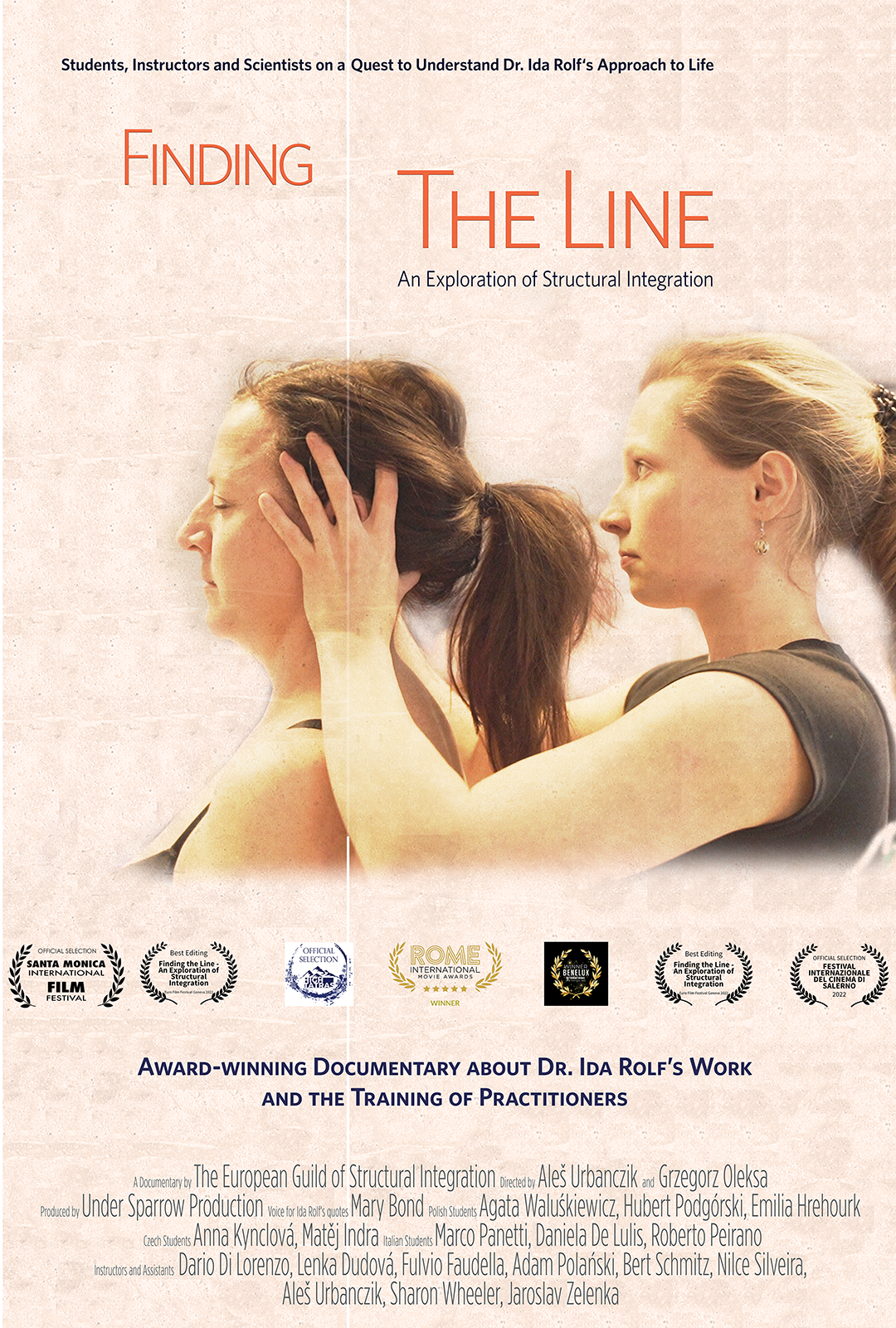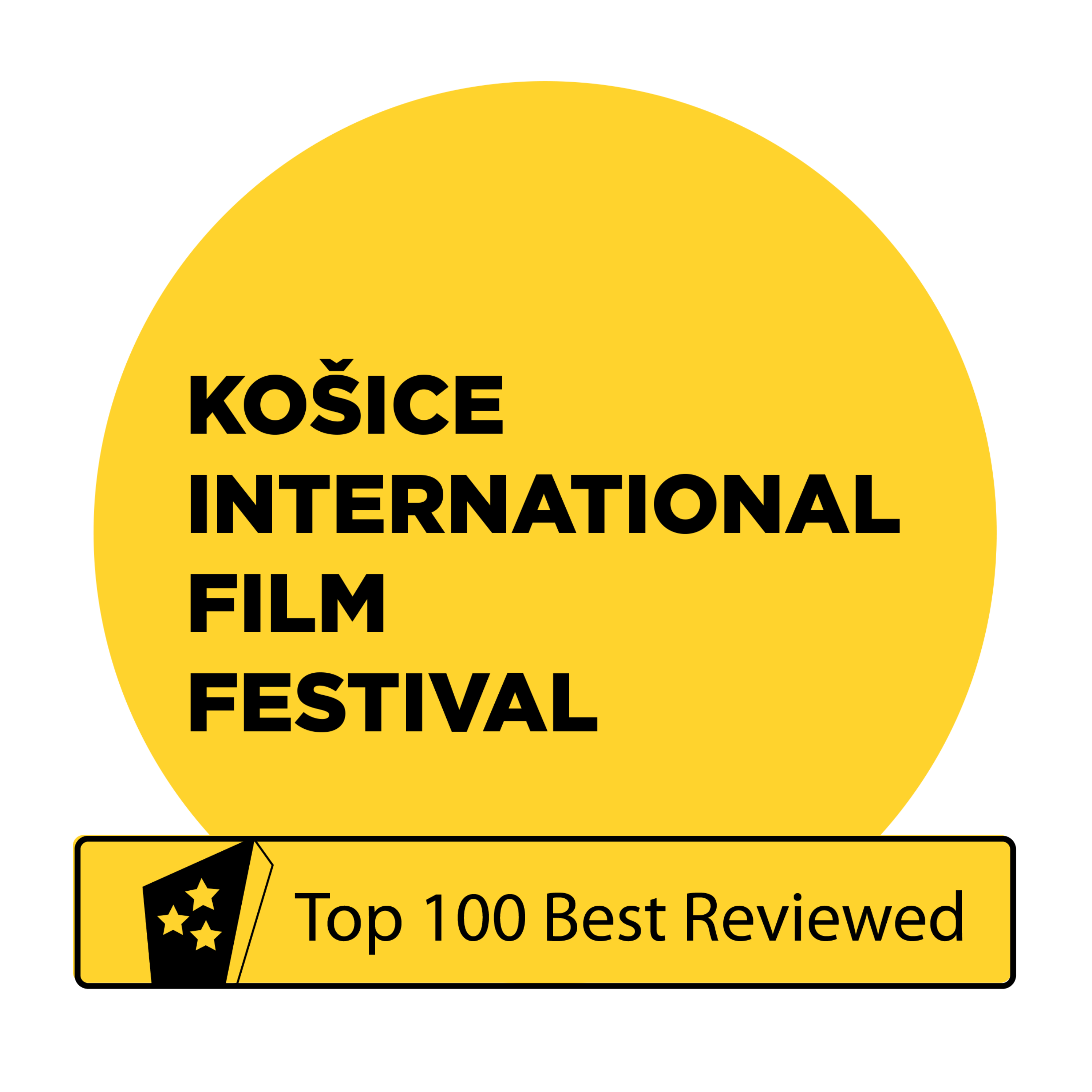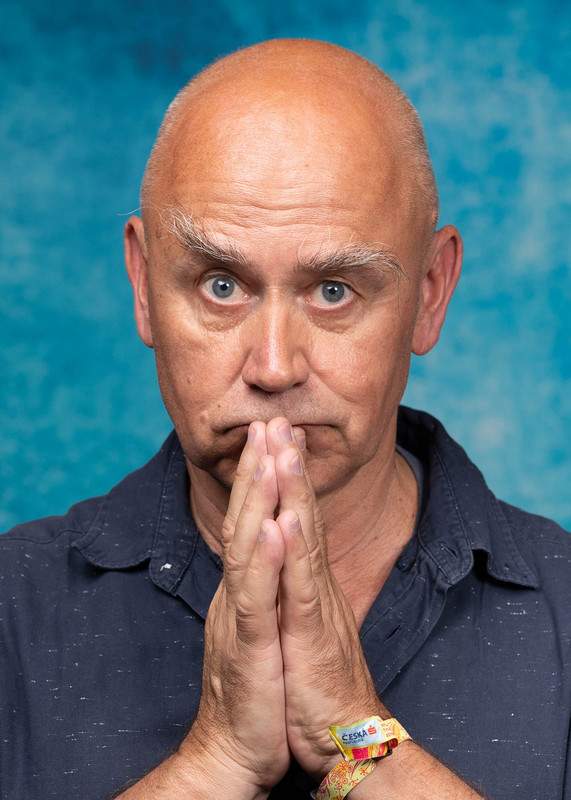Aleš Urbanczik
What is the story behind your film?
The movie is about an unusual subject . Nowadays the term 'fascia' is nearly a 'household' name. In fitness studios people work on their fascia, massage therapists massage it, yoga practitioners stretch it, people at home 'role' it and scientists are researching its properties. Our movie is about the woman who already pointed to the importance of fascia more than 50 years ago, at a time where, practically everyone, except a tiny circle of people, considered fascia to be some sort of inert filling material in the human body. This woman was Ida Rolf. Many people nowadays talk about fascia – very few people know or talk about Ida Rolf. She founded an approach of working with fascia she called Structural Integration.

What should people take away, gain, realize after watching your film?
Many of the things Ida Rolf claimed about the importance of fascia for the human body 'on the basis of observation' are being validated by contemporary scientific research. She had no tools, no imaging instruments like MRI or Ultrasound - she simply 'felt' what was going on. As an instructor of Structural Integration I am amazed how much students change during their 2 year training, how much they slowly become themselves, how the changes in their bodies and a different awareness influences their psychology in the best possible way. I wanted to document this change, let the students speak for themselves and at the same time allow the viewer to get to know Ida Rolf and her quest to explore the relationship between gravity and mankind. The movie demonstrates that true change is possible for anyone and that a good part of the change needs to be initiated by working on the physical body.

What do you take home from the experience of directing 'Finding the Line – An Exploration of Structural Integration'?
We learned a lot during this work, how to do things but also, maybe more importantly, how not to do things – I guess a typical 'first time director'.
Appetite for more ?
There will be a sequel. Next time about Ida Rolf's life, honoring and celebrating a woman who at her time had by dint of her own efforts, unaided (indeed, undermined rather than aided), promulgated, propagandized, demonstrated, taught, persuaded, organized - irreversibly brought into the world athing of great importance. And she did it all without money, without support, while rearing her children and living her life.
Tell us just a little bit about yourself
If I were to say something about myself...I was born in Prague in 1958. The first ten years of my life I spent in Czechoslovakia and the German Democratic Republic. In 1968, on holiday in the UK, my family was surprised by the invasion of Czechoslovakia by Soviet troops, and decided to seek refugee status in the UK. My mother's profession as a pediatrician led us to Switzerland 2 years later, where I went to school. After finishing High School I was accepted at the Acting Academy in Zurich, and having completed that, I spent 7 years on stage in German and Swiss theatres. The role I became best known for was Puck in Shakespeare's Midsummer Night's Dream. During my acting time I encountered Structural Integration. The physical experience was so powerful, that I decided to change professions and devote my life to exploring and later teaching the basic principles of Ida Rolf's work.
Why do you think your film should appeal to distributors?
I think the movie is in some ways 'old-fashioned'. It is slow - in stark contrast to the speed at which e.g. youtube videos operate - it sticks out. The jury at one of the festivals wrote to us: 'We never heard of this subject but it was perfect for making a documentary like this. We really liked the use of quote's in the film together with a voice over. That really made a sort of bridge in between sections without using b-roll but at the same time keeping everything on the same subject. Thank you for sharing this film with us!'
At which festival has your film been screened?
So far 'Finding the Line – An Exploration of Structural Integration' has been shown at over 50 festivals around the world and has won 20 awards.
'Official Selection 76th Edition of the FESTIVAL INTERNAZIONALE DEL CINEMA DI SALERNO'
and 'Best Documentary Rome International Movie Awards' are probably the ones that warmed our hearts the most.
If you could change something in your film, what would it be?
Well... it is a first movie both for me and my Cameraman and project partner Grzegorz Oleksa. We learned a lot. It is difficult to express precisely what we would change, but I am sure our next movie will benefit from this experience.
How did your acquaintances react when they first saw the film?
They really loved it. Some of them, more distant relatives, hadn't before realized the complexity of the subject Structural Integration and they learned a lot.
Aleš
Learn more about Aleš and Finding the Line – An Exploration of Structural Integration'
The movie is about an unusual subject . Nowadays the term 'fascia' is nearly a 'household' name. In fitness studios people work on their fascia, massage therapists massage it, yoga practitioners stretch it, people at home 'role' it and scientists are researching its properties. Our movie is about the woman who already pointed to the importance of fascia more than 50 years ago, at a time where, practically everyone, except a tiny circle of people, considered fascia to be some sort of inert filling material in the human body. This woman was Ida Rolf. Many people nowadays talk about fascia – very few people know or talk about Ida Rolf. She founded an approach of working with fascia she called Structural Integration.

What should people take away, gain, realize after watching your film?
Many of the things Ida Rolf claimed about the importance of fascia for the human body 'on the basis of observation' are being validated by contemporary scientific research. She had no tools, no imaging instruments like MRI or Ultrasound - she simply 'felt' what was going on. As an instructor of Structural Integration I am amazed how much students change during their 2 year training, how much they slowly become themselves, how the changes in their bodies and a different awareness influences their psychology in the best possible way. I wanted to document this change, let the students speak for themselves and at the same time allow the viewer to get to know Ida Rolf and her quest to explore the relationship between gravity and mankind. The movie demonstrates that true change is possible for anyone and that a good part of the change needs to be initiated by working on the physical body.

What do you take home from the experience of directing 'Finding the Line – An Exploration of Structural Integration'?
We learned a lot during this work, how to do things but also, maybe more importantly, how not to do things – I guess a typical 'first time director'.
Appetite for more ?
There will be a sequel. Next time about Ida Rolf's life, honoring and celebrating a woman who at her time had by dint of her own efforts, unaided (indeed, undermined rather than aided), promulgated, propagandized, demonstrated, taught, persuaded, organized - irreversibly brought into the world athing of great importance. And she did it all without money, without support, while rearing her children and living her life.
Tell us just a little bit about yourself
If I were to say something about myself...I was born in Prague in 1958. The first ten years of my life I spent in Czechoslovakia and the German Democratic Republic. In 1968, on holiday in the UK, my family was surprised by the invasion of Czechoslovakia by Soviet troops, and decided to seek refugee status in the UK. My mother's profession as a pediatrician led us to Switzerland 2 years later, where I went to school. After finishing High School I was accepted at the Acting Academy in Zurich, and having completed that, I spent 7 years on stage in German and Swiss theatres. The role I became best known for was Puck in Shakespeare's Midsummer Night's Dream. During my acting time I encountered Structural Integration. The physical experience was so powerful, that I decided to change professions and devote my life to exploring and later teaching the basic principles of Ida Rolf's work.
Why do you think your film should appeal to distributors?
I think the movie is in some ways 'old-fashioned'. It is slow - in stark contrast to the speed at which e.g. youtube videos operate - it sticks out. The jury at one of the festivals wrote to us: 'We never heard of this subject but it was perfect for making a documentary like this. We really liked the use of quote's in the film together with a voice over. That really made a sort of bridge in between sections without using b-roll but at the same time keeping everything on the same subject. Thank you for sharing this film with us!'
At which festival has your film been screened?
So far 'Finding the Line – An Exploration of Structural Integration' has been shown at over 50 festivals around the world and has won 20 awards.
'Official Selection 76th Edition of the FESTIVAL INTERNAZIONALE DEL CINEMA DI SALERNO'
and 'Best Documentary Rome International Movie Awards' are probably the ones that warmed our hearts the most.
If you could change something in your film, what would it be?
Well... it is a first movie both for me and my Cameraman and project partner Grzegorz Oleksa. We learned a lot. It is difficult to express precisely what we would change, but I am sure our next movie will benefit from this experience.
How did your acquaintances react when they first saw the film?
They really loved it. Some of them, more distant relatives, hadn't before realized the complexity of the subject Structural Integration and they learned a lot.
Aleš
Learn more about Aleš and Finding the Line – An Exploration of Structural Integration'

